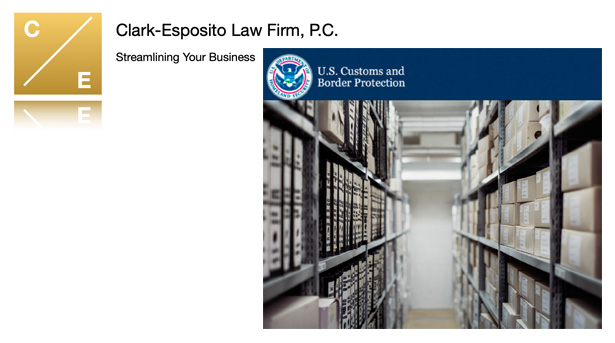
CBP's Updated Position on Imports to Warehouses & Fulfillment Centers
U.S. Customs Rules on Imports to Domestic Warehouses and Fulfillment Centers
Use and Misuse of Section 321 Privilege
Under U.S. Import Regulations
As many importers have recently discovered, under administrative exemptions codified in the U.S. import regulations, U.S. Customs and Border Protection may admit certain merchandise duty- and tax-free if it is imported by "one person on one day" and has a total fair retail value in the country of shipment of $800 or less (Section 321 privileges).
In a recent administrative ruling, U.S. Customs and Border Protection has recognized domestic warehouses and fulfillment centers as an acceptable definition of "one person" for the purposes of Section 321 privileges.
The privilege is however subject to misuse, and U.S. Customs and Border Protection is taking active steps to both educate eligible entities and to identify those who are in violation of Section 321 regulations. U.S. Customs and Border Protection has warned that it may take enforcement action against repeat and egregious violators by placing holds on ineligible shipments, requiring formal entry, or by revoking this privilege.
We have covered guidance for compliance, depending on the status of the entity, in our full article on the Section 321 privilege. Our full article can be accessed by clicking the button below. There you can find the full article, guidance on compliance by entity-type, as well as a link to the relevant administrative ruling. Please feel free to share this email or our full article on this subject with your colleagues who may also find the information helpful.
If you have additional questions on the Section 321 privilege or questions about general imports regulation, we can be reached at contact@clarkespositolaw.com for assistance.
Clark-Esposito Law, P.C.
Clark-Esposito Law Firm, P.C. ©2021
1345 Avenue of the Americas, 33 Fl.
New York NY 10105
(917) 546-6997
www.ClarkEspositoLaw.com
DISCLAIMER: The content of this website has been prepared by the Clark-Esposito Law Firm, P.C. for informational purposes only and should not be construed as legal advice. The material contained in this email newsletter is not intended to create, and receipt of it does not constitute, a lawyer-client relationship, and readers should not act upon it without seeking professional legal counsel. The Clark-Esposito Law Firm, P.C., did not produce and is not responsible for the content of off-site legal resources. The materials on this site may constitute advertising under various state ethics rules.
